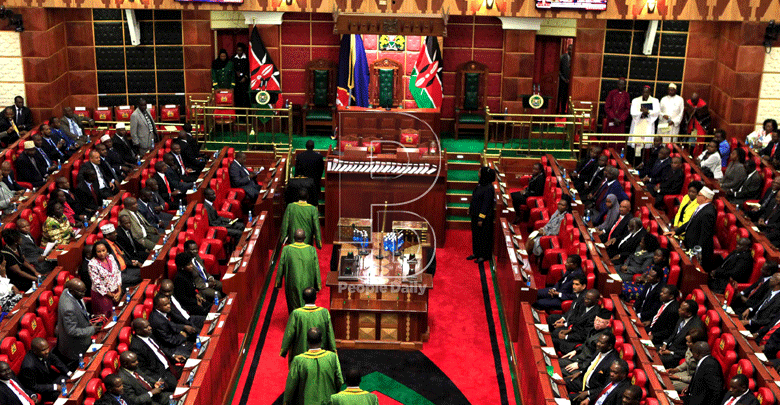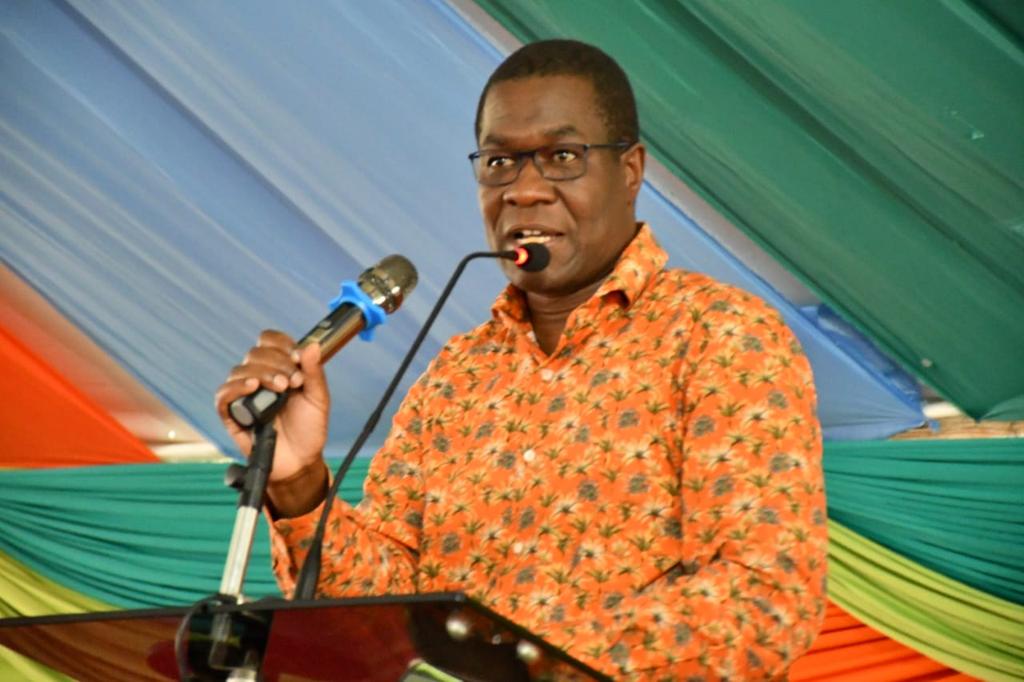BBI headed for plebiscite after MPs approve it

Mercy Mwai and Anthony Mwangi
The Building Bridges Initiative (BBI) Bill was headed for big victory last night with a majority of the MPs voting a resounding “Yes” to the constitutional changes project.
Voting for the Second Reading got underway at exactly 6.06 pm after National Assembly Speaker Justin Muturi confirmed that the House had the requisite quorum to start the exercise.
A total of 235 members voted Yes, 83 members voted No, while two abstained bringing the total number of lawmakers who voted to 320.
The exercise started after Muhoroni MP James Onyango K’Oyoo rose on a point of order and asked the mover of the Bill to be called to reply, arguing that most MPs were repeating what their colleagues had contributed earlier.
“Under Standing Order 95, Mr Speaker, can you call the mover to reply,” said K’Oyoo.
Firm instructions
Those who voted in support of the Bill included Majority Leader Amos Kimunya, Maina Kamanda, Babu Owino, Ayub Savula, Badi Twalib, Lilian Gogo and David ole Sankok, an ally of Deputy President William Ruto.
Others were Zulekha Hassan, Irbae Buya, Hulufo Hassan, Ibrahim Ahmed, Injendi Malulu,
Patrick Wainaina, Tom Kajwang, Peter Kaluma and Maina Kamanda, Kanini Kega, Alfred Keter, Ann Kibe, Muturi Kigano, Michael Kingi and Jeremiah Kioni.
The naysayers included former Majority Leader Aden Duale, Beatrice Kones, Faith Gitau, Charles Gimose, Hassan Rehema and Kimani Ichung’wa.
Others were George Kariuki, Rehema Jaldesa, Aisha Jumwa, Johanna Ng’eno, Julias Melly, William Cheptumo, Joseph Tonui, Wilson Kogo and Nelson Koech, Beatrice Kones, Nixon Korir, Koros Kipsengeret, Henry Kosgei, Caleb Kositany, John Waluke, Dominic Koskei, Liza Chelule and Moses Lessonet.
Deputy National Assembly Speaker Moses Cheboi abstained. Earlier, Kimunya had moved a procedural motion asking the House to extend the evening sitting until the debate on the Bill was concluded.
Lobbying for the Bill’s approval had started as early as Wednesday night with Kimunya and his Minority counterpart John Mbadi and their respective whips had embarked on last-minute lobbying among legislators to ensure the proposals passed.
They used all available means and resources to mobilise members including sending text messages requesting them to turn up to vote for the Bill.
Several MPs, who did not want to be identified, confirmed they had received firm instructions from their parties that should they fail to support the Bill, disciplinary action would be taken against them.
MPs Johanna Ngen’o (Emurua Dikir) and Kathuri Murungi (South Imenti), confirmed they had received text messages from the leadership of the House asking them to make themselves available for voting.
“We have received SMS messages asking us to converge in the House at 2pm for purposes of voting, Mr Speaker I would like to know if this is the position and what will you advise on this matter,” said Murungi.
“Mr Speaker I would like to ask the Leader of Majority whether we will be given more time to debate this Bill based on the fact that we received text messages asking us to avail ourselves here,” he said.
On the floor of the House, similar efforts to have the Bill passed were evident as the morning session was extended to 2pm from the usual 1pm, while time for members to contribute was reduced from 15 minutes to seven minutes to allow more members to contribute to it.
The motion to reduce the debating time was introduced by Kimunya and seconded by Mbadi.
Kimunya’s move to table a procedural motion was given the go-ahead by the House Business Committee, which sets the agenda of the House.
Efforts by a section of MPs led by Duale, seeking to stop debate on the motion, failed and the legislators went ahead and approved Kimunya’s request.
Minority Whip Junet Mohammed said the Bill will benefit ordinary Kenyans, as it will deal with some of the problems that have been troubling the country for a long time.
“I support the Bill fully, this Bill has proven to be for all the people, it has given many people an opportunity to speak their views,” he said.
Nominated MP Maison Leshomo supported it, saying it is a people’s Bill that ought to be supported by all members.
Future generations
Homa Bay MP Gladys Wanga said a vote for BBI is a vote to strengthen the economy, as it would build a prosperous tomorrow for future generations.
She said the biggest gain in the Bill is the issue of the two-thirds gender rule, which has now been settled after pushing for it for the last 50 years.
“It is not true that we are clipping the powers of the Judiciary because the amendment empowers the JSC to listen and investigate allegations against judges.
Why do we feel the Judiciary is more independent when the President forms a judiciary ombudsman than when the JSC reviews its peers?
Whatever is being said is just stories, what we know is that BBI is strengthening the powers of the Judiciary,” she added.
Maragua MP Mary Wamua said the additional 70 constituencies in the Bill will ensure fair representation and distribution of resources.
“The content being proposed in this Bill is aimed at making the Constitution of 2010 better. All that has been proposed here is touching on how to improve our people economically and politically,” she said.
But Baringo North MP William Cheptumo while opposing the Bill said it claws back gains realised in the 2010 Constitution.
“I oppose this Bill. Eleven years ago, Kenyans enacted the 2010 Constitution, which is the most progressive Constitution [in the world].
The questions we need to ask ourselves in this House is if indeed to solve the issues we have in this country, the solution lies in amending the Constitution yet the two elections that came after the 2010 constitution, there was still violence,” he said.
In his opposition, Duale said there were weighty constitutional issues that should have been addressed and after 30 years the decision the members will make will come to haunt them.
“My first issue is on clause 44 of this Bill, the creation of a Judiciary Ombudsman is a dangerous trend, as the country has had the independence of the Judiciary devoid of interference from other arms of government as it was only guided by the Constitution, but what we have done is to erode all these gains,” he added.
Kikuyu MP Ichung’wa opposed the Bill terming it deceptive as it erodes gains realised by the 2010 constitution.
“This is a very deceptive Bill right from the start, it is a popular initiative by the political class for the benefit and interest only for the political class.
This Bill claws back on the gains so far realised as it takes away the powers of the National Police Service Commission and giving back one individual who is the Inspector General of Police as well as the clipping of the powers of the Judicial Service Commission and transferring the same to a Judiciary Ombudsman, who will be at the mercy of the President,” he said.












